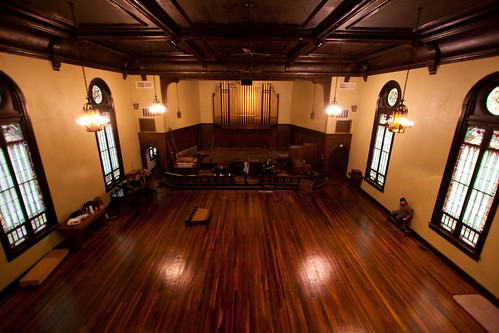As a part of the larger "occupy"movement, people are being asked to put their money where their mouth is... literally... and close their accounts with the the big guys on Wall Street and to move that money to local banks and community credit unions. A link to the pledge can be found here: http://www.rebuildthedream.com/move-your-money/
 I like this idea. I appreciate local businesses. I like the accountability that comes when you are in personal contact with the people who take care of your money. I like that it is more than just feet on the ground complaining about things they don't like, but people willing to make changes in their personal lives based upon the message they are preaching.
I like this idea. I appreciate local businesses. I like the accountability that comes when you are in personal contact with the people who take care of your money. I like that it is more than just feet on the ground complaining about things they don't like, but people willing to make changes in their personal lives based upon the message they are preaching.
I don't like what doing this would do to my personal credit rating.
When the pledge first crossed my desk, I immediately went and started searching for information on the statewide United Methodist supported credit union. I looked at loan rates and credit card rates and started doing the math to see what kind of a personal financial impact it would have if I closed my accounts with the "big banks" and moved my debt and my checking account somewhere more local.
My Bank of America credit line has been around for over 11 years. As a freshamn in college, I caved to the credit card pressure... but it was a "Working Assets" card - and they donated 1% every year to non-profits that you get to choose. At the time, I justified my decision, thinking it was the "conscientious choice"... if I was going to have a credit card, that's the one I wanted. But they were bought out by the big guys and I've been with BoA ever since. Because I have been with them for a while, and pay my bills faithfully, it is also my largest line of credit.
The only line of credit I have with Citigroup is fairly new... and I opened the card to transfer some balances with no interest so that I could work on paying off debt from college/seminary/long-distance-relationship-plane-tickets...
To close the first account and to open a new one would drastically reduce both my average age of open credit lines and my open card utilization percentage... thereby significantly affecting my credit score (especially since I have that newer line of credit from only a year ago).
To transfer balances would involve fees and especially with the Citigroup account, I still have another year of no interest and would rather spend that time paying off that little amount, rather than incurring another fee and having to pay interest.
Argh...
Sometimes, doing something that is seems right, hurts. Taking a stand involves personal cost. Finding the courage to literally put our money where our mouth is... priceless.
(sorry, I couldn't resist).
But we should spend time wrestling with financial questions.
- Where is my money invested?
- Who benefits from my money/debt?
- What kind of transformative change does the power of a single dollar have?
- Does my bank align with my values?
- What kind of damage does debt do to my spiritual life?
- What does your spending say about your spiritual life?


